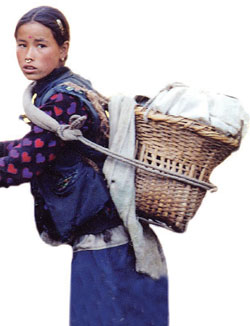|
|
Nearly 60,000 Nepali women have had legal abortions since March 2004. But despite the impressive numbers, there are still huge obstacles to guarantee women's right to safe abortion.
For example, over 10 percent of women who sought abortions at 22 facilities in the country from January to March 2006 were rejected because they were more than 12 weeks pregnant, according to a recent study by the Centre for Research on Environment, Health and Population Activities.
Anand Tamang of CREHPA, which produced the National Facility-based Abortion Baseline Study says so many women are turned away because they calculate their date of conception differently than the law does.
That ignorance of the law's particulars is not surprising, since the study also found that only 50 percent of women seeking what is known as comprehensive abortion care (CAC) were aware that it is legal. Of those, less than half knew that it was permitted on request during the first 12 weeks of pregnancy.
Abortion is permissible up to 12 weeks, until 18 weeks if the pregnancy resulted from rape or incest and any time, with a doctor's consent, if the women's health is in danger or the foetus is severely deformed.
Four years before abortion was legalised, a Ministry of Health study estimated that 54 percent of maternal deaths were caused by unsafe abortion.
"I think (unsafe abortions) have been reduced. But still they come," says Dr Sudha Thapa, deputy director at Maternity Hospital, the country's only training centre for doctors-and in a current pilot project, nurses-who must be certified before they can perform the procedure.
Another CREHPA study found that of 1,560 cases treated at Maternity Hospital from April 2004-2005, 138 were for complications caused by induced abortion.
"A big challenge is educating women (and men) of their rights to safe abortion and what is safe abortion," says Wendy Darby of Ipas, a US-based NGO that has given considerable financial and technical support to Nepal's Safe Abortion Program.
Poor information dissemination, high cost, and lack of staffed service centres have been directly responsible for the jailing of more than a dozen women since the abortion law was changed (see, Jailed).
In urban areas, government, private and NGO facilities all offer CAC while government centres predominate in rural Nepal. And although the government has twice as many certified facilities, the others have performed more than three times as many abortions.
Sixty-eight of Nepal's 75 districts now have at least one trained service provider, but "23 of them are not yet providing services, for a variety of reasons," Darby told us via email.
Laxmi Raj Pathak helped push the abortion bill through parliament when he was director of the Health Ministry's Family Health Division. He blames slow decision-making for inadequate abortion services in rural areas, the result of poor management. "People are committed but no one wants to take risks," he told us. "If you want to serve rural people you have to deviate from the guidelines sometimes."
Jailed
When Shruti learned she was pregnant she decided that she did not want to have the baby. The married woman went to the hospital in Dhankuta, where she discovered she didn't have enough money for the procedure (which averages just over Rs 1,000 in government hospitals). She returned home.
Months later the child was 'stillborn', Shruti (not her real name) told police after they were alerted about the dead baby. She repeated that story again at the district court, which found her guilty of homicide but sentenced her to just five years; the maximum is 20 years.
An appellate court upheld the shorter sentence but Forum for Women, Law and Development is appealing it to the Supreme Court, arguing that the abortion fee deprived Shruti of her right to abortion.
There are other obstacles, FWLD's Lokhari Bashyal told us. "Sometimes women pass the legal deadline for an abortion (12 weeks) for lack of knowledge. Even if there is an authorised hospital or clinic, sometimes the doctor is not there."
Hospital overburdened
Nepal's first legal abortion was performed in Maternity Hospital in March 2004, and nearly 300 doctors and over 200 nurse assistants have been trained to deliver comprehensive abortion care. But the hospital's CAC unit still struggles to meet demand. "Some days 25-30 women come. Some are rejected, some we do abortions for-about 15 a day-and some we ask to come a few days later," says CAC Coordinator Dr Sudha Thapa, sitting in the unit's cramped training room.
The doctors trained at the unit leave, and there is usually just one doctor on duty. Nurse training is meant to meet some of the demand, and other training centres are soon to open in Butwal and Pokhara.
Lack of knowledge remains the biggest obstacle to women getting safe abortions, according to Thapa. "Even doctors who come to work here don't know about the law, so how can the public know?"



